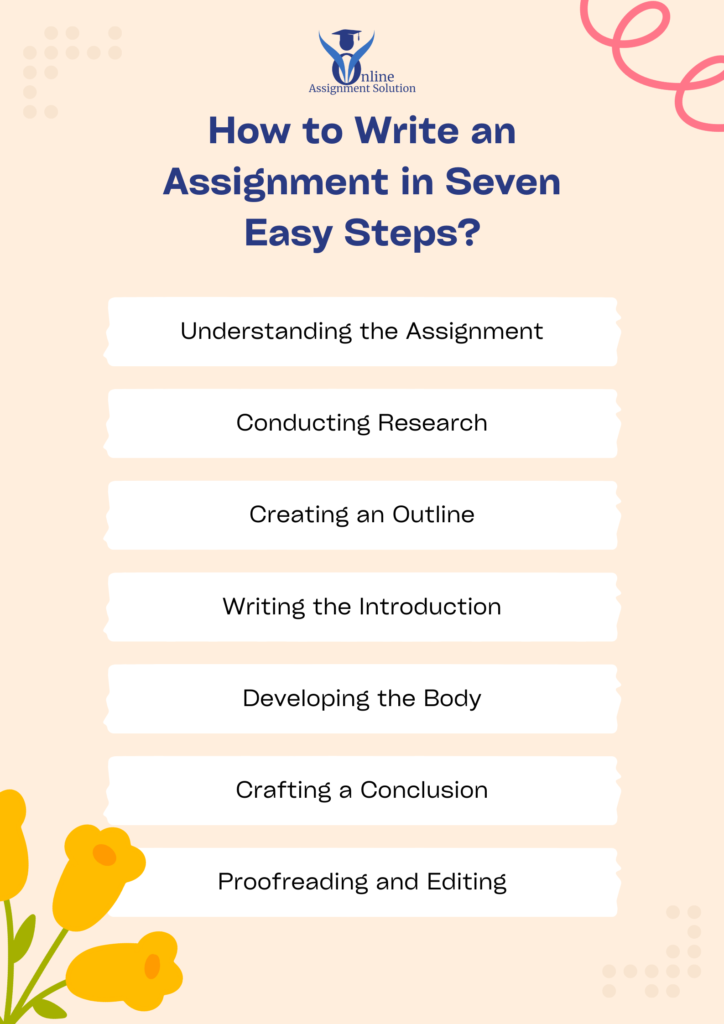
Writing assignments can often seem like a daunting task, but with the right approach and a clear plan, it can become much more manageable. Whether you are a student or a professional, mastering the art of assignment writing is essential for success. In this article, we will guide you through seven easy steps that will help you write an assignment effectively.

Before diving into writing, it is crucial to thoroughly understand the assignment requirements. Read the instructions carefully, noting the topic, word count, formatting guidelines, and any specific criteria provided by your instructor or client. Take the time to clarify any doubts or questions you may have regarding the assignment.
Once you have a clear understanding of the assignment, it’s time to gather relevant information through research. Utilize both primary and secondary sources such as books, academic journals, reputable websites, and scholarly databases. Take comprehensive notes and organize them according to the sections of your assignment.
An outline acts as a roadmap for your assignment, ensuring a logical flow of ideas. Start by structuring your assignment into sections, including an introduction, body paragraphs, and a conclusion. Break down each section further into subsections if necessary. This step will provide you with a clear overview of your assignment’s structure and help you stay focused.
The introduction sets the tone for your assignment and grabs the reader’s attention. Start with a compelling hook or an interesting fact related to your topic. Provide a brief overview of the subject matter and state your thesis statement, which highlights the main argument or purpose of your assignment.
The body paragraphs serve as the backbone of your assignment. Each paragraph should focus on a single idea or argument, supported by evidence from your research. Begin with a topic sentence that introduces the main point of the paragraph. Follow it up with supporting details, examples, or statistics. Use transitions to ensure a smooth flow between paragraphs.
The conclusion wraps up your assignment and reinforces the main points you discussed. Summarize your key arguments briefly and demonstrate how they contribute to your overall thesis statement. Avoid introducing new information in the conclusion. Instead, leave the reader with a thought-provoking statement or a call to action related to your topic.
Proofreading and editing are crucial steps to ensure your assignment is error-free and polished. Read through your assignment carefully, checking for spelling, grammar, and punctuation mistakes. Ensure that your sentences are clear, concise, and coherent. Consider seeking feedback from a peer or a professional editor to gain a fresh perspective on your work.

Writing an assignment can be a straightforward process if you follow these seven easy steps. Understanding the assignment, conducting thorough research, creating an outline, writing a compelling introduction, developing a well-structured body, crafting a strong conclusion, and proofreading diligently are key elements to produce a successful assignment. By adopting these strategies, you can enhance your writing skills and achieve better results in your academic or professional pursuits.
A: The length of an assignment depends on the specific requirements provided by your instructor or client. It is essential to adhere to the prescribed word count or page limit.
A: Yes, incorporating personal experiences can add depth and authenticity to your assignment, especially when relevant to the topic.
A: Yes, providing proper citations for any external sources used in your assignment is essential to avoid plagiarism and give credit to the original authors.
A: It is generally recommended to write the introduction after developing the body paragraphs. This way, you have a better understanding of the content and can create a more concise and impactful introduction.
A: To enhance your proofreading skills, take breaks between writing and proofreading sessions, read your work aloud, use spelling and grammar checking tools, and seek feedback from others.
Online assignment solution can provide valuable assistance to students facing challenges in completing their assignments. Firstly, online platforms offer a wide range of resources and materials that can help students better understand the subject matter and improve their knowledge base. These resources may include sample assignments, study guides, video tutorials, and interactive learning modules. By accessing these resources, students can gain a deeper understanding of the topic, clarify their doubts, and enhance their overall comprehension.

Get Industry Ready With Access to Latest Updates!
Now Don’t Miss Out On Any Trending Revelation in the Assignment Writing Industry.
Get An Expert Advice, Whatsapp Us
Essay Writing Help
Research Paper Writing Services
Coursework Help
Thesis Writing Services
Case Study Help
Term Paper Writing Services
© 2023 Online Assignment Solution
© 2023 Created by Sagnick
